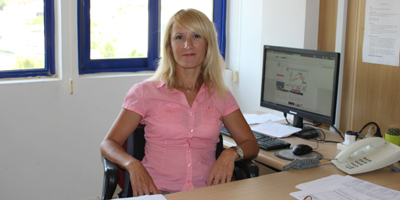Çiftçioğlu’s research on Lefke Region’s Terrestrial and Marine Landscapes

Head of European University of Lefke (EUL) Faculty of Architecture Department of Landscape Architecture Prof. Dr. Gülay Çetinkaya Çiftçioğlu evaluated Terrestrial and Marine Landscapes from a socio-ecologic perspective.
Çiftçioğlu: Socio-ecologically efficient landscapes offer a range of benefits to the people of the region
Çiftçioğlu emphasized that socio-ecologically efficient landscapes refer to land and sea landscapes which have high capacity of endurance against complex, denaturalizing factors stem from the interaction of social and ecological systems; which offer a range of benefits to the people of the region; and which are human-nature oriented and added that supporting the durability / stability of these landscapes contributes to the development of conservation of biodiversity, food safety and sustainable local life models. Çiftçioğlu stated that the sustainability of the mentioned landscapes can be achieved through the integration of a management model that supports a harmonious relationship between human and nature and added that, in this sense, Adaptive Collaborative-Management is of great importance. Çiftçioğlu said that mentioned model is a management model established in 1997 with the aim of managing complex socio-ecologic landscape systems.
Çiftçioğlu said that, she has conducted a searched based on the evaluation of Adaptive Collaborative-Management of the strength of the current management system of terrestrial and marine landscapes in the Lefke Region that are still socio-ecologically productive and added that her research was published by Springer in the Sustainability Science Journal which is published in Japan.
Çiftçioğlu stated that, in her published article titled “Assessment of the resilience of socio-ecological production landscapes and seascapes: A case study from Lefke Region of North Cyprus” she has analyzed five features of Adaptive Collaborative-Management in Lefke Region landscapes scale and listed these features as; The diversity of social learning tools in the Lefke Region; the effectiveness of social networks among existing institutions in the region; the role of traditional ecological knowledge in landscape management; effectiveness of current laws in the protection and management of landscapes; and Potential legal mechanisms and / or tools for strengthening landscape management in the TRNC and the Lefke Region.
Giving information about the research model of her study Çiftçioğlu stated the process as; development of the theoretical framework of the Adaptive Collaborative-Management model for Lefke landscapes; identification of potential indicators for evaluating the Adaptive Collaborative-Management model and collection of data with semi-structured interviews of the data for the specified indicators and added that the semi-structured interviews were conducted with 28 people working in locations such as institutions / organizations / voluntary organizations with direct and / or indirect responsibility for landscape management in the Lefke Region.
Pointing out that collected data on indicators were evaluated on 1-5 likert scale Çiftçioğlu said that, “As a result it is observed that; relative averages of the existence and diversity of social learning tools, the basic components of the Adaptive Collaborative-Management model based on Lefke Landscapes is 1,86 which is very low; the relative average of the integration of traditional ecological knowledge with scientific knowledge is 1,97 which is very low; relative average of cooperation between institutions on the basis of landscape management is 2,88 which is low; relative average of the existence and management of legal mechanisms related to landscape conservation and management is 2,37 which is low and Total relative average of landscape management in Lefke Region is 2,37 which is low”.
